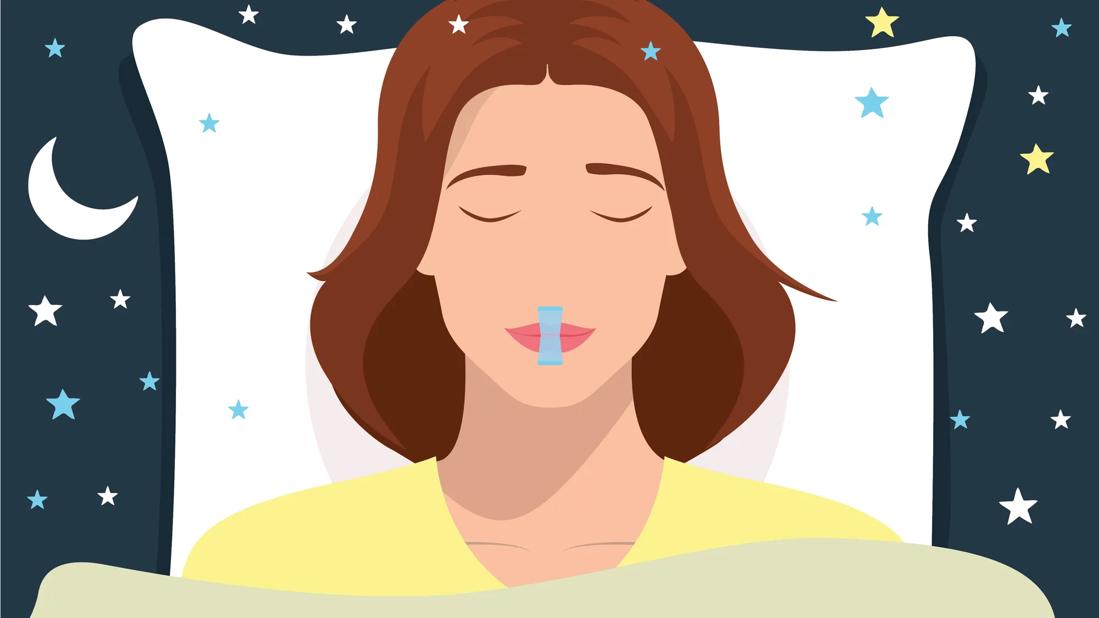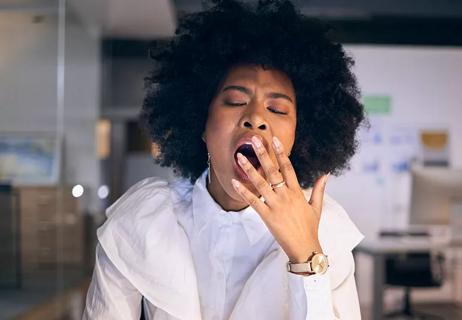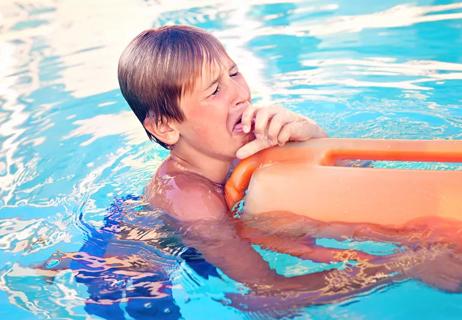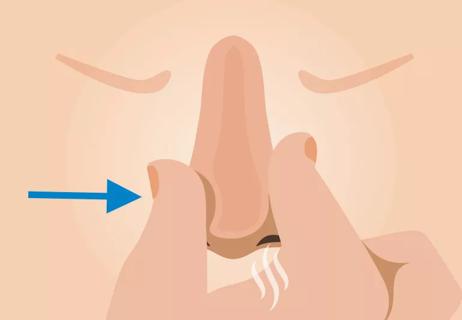Mouth taping may seem promising, but it can actually cause more harm than good, especially if you snore or have sleep apnea

Mouth breathers can get a lot of flak for snoring. In trying to find a quick fix, some may turn to mouth taping. But does it work? And is it safe to use while sleeping?
Advertisement
Cleveland Clinic is a non-profit academic medical center. Advertising on our site helps support our mission. We do not endorse non-Cleveland Clinic products or services. Policy
Pediatric sleep medicine specialist Brian Chen, MD, says mouth taping can cause other complications when you’re trying to get a full night’s rest.
Dr. Chen discusses why this trend isn’t all it’s cracked up to be and what you should do instead.
Mouth taping is the act of taping your mouth shut with medical-grade, skin-safe adhesive tape so you’re forced to breathe through your nose instead of your mouth. This can supposedly prevent snoring while you’re sleeping.
The idea grew in popularity thanks to a once-viral TikTok trend, where influencers claimed many possible benefits.
The theory is that mouth taping helps you to better breathe through your nose, which is considered healthier than mouth breathing. Breathing through your nose when you sleep can help:
But taping your mouth shut can cause more harm than good.

Image content: This image is available to view online.
View image online (https://assets.clevelandclinic.org/transform/68824166-a7d5-48e0-8d01-1ec23fe2923d/mouth-tape-infographic)
Mouth taping comes with a few risks. It may cause:
Advertisement
These complications may become increasingly difficult if you’ve always been a mouth breather and have a hard time adjusting to mouth tape. Dr. Chen also says you should never use it if you have:
“For individuals already struggling with conditions like nasal obstruction or chronic allergies, mouth taping introduces an unacceptable level of risk,” Dr. Chen emphasizes. “Having your mouth taped closed forces you to rely on only your nose for air, potentially leading to severe respiratory distress, significant drops in oxygen levels and exacerbation of underlying health issues during sleep.”
There’s not enough scientific evidence that shows mouth taping works as a way to stop snoring. Part of the problem is that there are so few studies on mouth tape — and those that do exist are focused on very small populations.
“Plus, most of the evidence is anecdotal,” Dr. Chen notes.
For example, one small study showed that 30 people snored less after mouth taping. But another study of 36 people with asthma showed no signs of change in their condition after mouth taping. And a 2022 study revealed that 10 participants struggled with a phenomenon called mouth puffing, where they continued to try mouth breathing even after their mouths had been taped shut.
“There’s not strong enough evidence to support that mouth tape is beneficial, and it’s not part of our current practice to treat any sleep disorder,” reiterates Dr. Chen. “Mouth taping could also cause an allergic reaction from the tape or a skin irritation or rash, so you should always talk to a doctor before starting this practice.”
Although some swear by using mouth tape for snoring and sleep apnea, Dr. Chen says it’s not recommended. Instead, there are safer solutions to stop snoring, like:
“Snoring can be a sign of other conditions, like sleep apnea,” explains Dr. Chen. “Mouth taping seems like a solution, but it’s only a short-term fix for what might be a larger problem with your airways. Before trying mouth tape, talk to your doctor about what’s really going on.”
Advertisement
Learn more about our editorial process.
Advertisement

Changing how you breathe, gargling water and distracting yourself are all common ways to stop your diaphragm from spasming

Simple at-home solutions, like doing pursed lip breathing and drinking a warm beverage, can often bring immediate relief

When something like food or drink goes down your windpipe rather than your esophagus, it can cause coughing and sometimes choking

Getting vaccinated in October can help protect you against severe illness between November and March

Breathing through your nose is far better for you, but depending on your anatomy, that may not always be possible

One theory is brain temperature regulation, and yes, a ‘contagious yawn’ is a real thing

Dry drowning is an airway closure from choking on water without getting fluid in your lungs

This style of breathwork can invigorate you and help you focus

Wearing a scarf, adjusting your outdoor activities and following your asthma treatment plan can help limit breathing problems

Your diet in the weeks, days and hours ahead of your race can power you to the finish line

When someone guilt trips you, they’re using emotionally manipulative behavior to try to get you to act a certain way